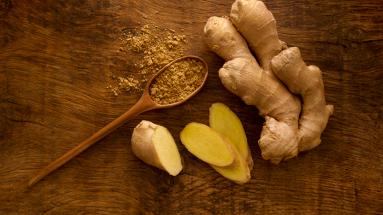To eat organic, or not—that’s our question!
To eat organic, or not—that’s our question!

Eating healthy is important for everyone—especially for those living with cancer.
But with so many different food trends, it can be difficult to figure out what to look for at the grocery store.
- Should you buy organic products?
- Should you avoid GMOs, or genetically modified organisms?
- What foods should I avoid?
It's not clear if organic foods are more nutritious, or if they have other health benefits like reducing your risk for cancer. But what is clear is that a diet of mostly fruits, vegetables and whole grains is essential to good health.
So, what should I buy organic?
Organic produce tends to have lower levels of pesticides. Since the following foods often have high levels of pesticides, consider buying them organic:
- Strawberries
- Spinach
- Kale
- Nectarines
- Apples
- Grapes
- Peaches
- Cherries
- Pears
- Tomatoes
- Celery
- Potatoes
Don't have the budget to buy everything organic? Don't worry. Here are some examples of produce traditionally grown with very low pesticide residue:
- Avocados
- Sweet corn
- Pineapples
- Frozen sweet peas
- Onions
- Papayas
- Eggplants
- Asparagus
- Kiwis
- Cabbages
- Cauliflower
- Cantaloupes
- Broccoli
- Mushrooms
- Honeydew melons
Are GMOs dangerous?
GMOs are plants, animals or microorganisms that have been genetically engineered.
In order for the US Department of Agriculture to label their products as organic, farmers must prove that they aren't using GMOs and that their products have not touched any prohibited substances like GMOs. Because of this, you might decide to avoid eating any food that is genetically modified. However, you might find it helpful to know that all GMOs have to meet certain safety standards, and, so far, there's no evidence showing that eating GMOs has a negative effect on our health.
Are there any foods I should avoid?
At your next trip to the grocery store, here are a few things to skip:
- Processed meat: This includes cold cuts, bacon, sausage or hot dogs.
- Red meat: Try to eat less beef, pork or lamb. Instead, try fish, poultry or beans. If you do eat red meat, pick lean cuts and keep your servings small.
- Refined grains: These often have less fiber or are missing other compounds that might reduce your risk for cancer. Instead, opt for whole grain bread, pasta or cereal.
- Refined carbohydrates: These include baked goods, candy, sugary cereal and other foods with a high sugar content.
- Alcohol: If you do drink, try not to have too much. For men, that means no more than two drinks per day, and for women, no more than one.
Whether you choose to eat organic or not, we hope you find this information helpful as you plan your meals and write that grocery list!
















